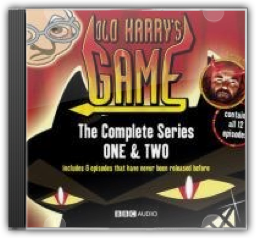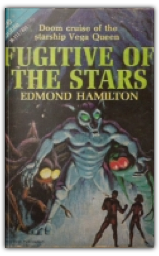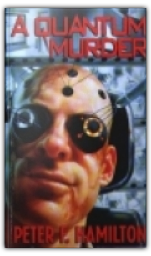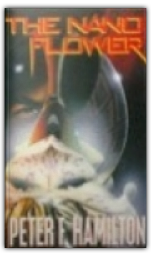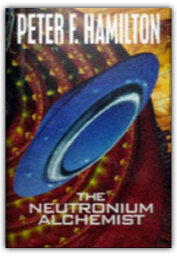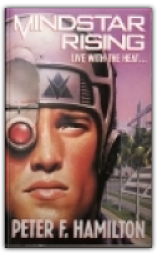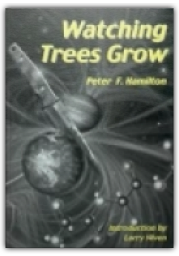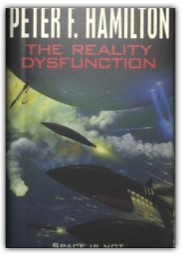 The Reality Dysfunction
Peter F. Hamilton
The Reality Dysfunction
Peter F. Hamilton
The term "space opera" has evolved over the decades. Originally it meant "hacky, grinding, stinking, outworn, spaceship yarn" (Wilson Tucker), but since then it has come to be (slightly) less pejorative, encompassing any sci-fi action story on an interplanetary or interstellar scale. The Reality Dysfunction rests firmly in the space- opera camp with its intense starship combat, roguish space captains and raw frontier planets, but Peter Hamilton keeps the formula fresh and up-to-date with an infusion of "modern" science fiction technology. His universe is digitally and nanotechnologically savvy, which opens up plenty of possibilities for new perils and plot twists. 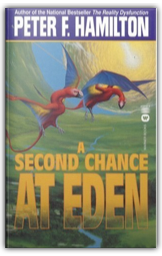 A Second Chance at Eden
Peter F. Hamilton
A Second Chance at Eden
Peter F. Hamilton
This is Hamilton's first collection of short stories (including one novella), set in the same universe as the bestselling Night's Dawn trilogy. Actually, as Hamilton himself admits, the original versions of these stories had nothing to do with Night's Dawn, but he has used the opportunity of this collection to tweak (or almost completely rewrite) all his earlier works and bring them in line. This process seems to affect most sci-fi novelists at some point in their careers and is probably a cathartic milestone in the transition from new sci-fi author to bestselling author. 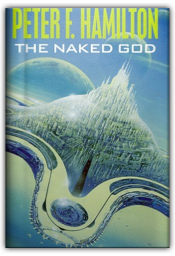 The Naked God
Peter F. Hamilton
The Naked God
Peter F. Hamilton
Peter F. Hamilton's Night's Dawn trilogy—The Reality Dysfunction, The Neutronium Alchemist and now The Naked God—is ambitious in its galaxy-wide, multiple viewpoint plot, its political and metaphysical subject-matter, its sheer three-thousand page scope. The damned have broken out of the afterlife and possessed whole planets; a gallant and untrustworthy space captain is haring off after alien sorts; and for the resurrected Al Capone, the secret masters of Earth and the government of the human Confederacy, it is business as usual... Hamilton's super-charged villain, Dexter Quinn, arrives on the home planet of humanity with a mission—to convert enough people to his Satanist creed that Earth can be taken out of the universe altogether; "Quinn raised an arm, his sleeve falling to reveal an albino hand with grizzled claw fingers. Three thin streamers of white fire lashed out from the talons, searingly bright in the gloomy, smoke-heavy air." The many fans of Hamilton's high-octane gloomy space opera will find this finale a worthy successor, and thrill to its many surprises; Hamilton's evocation of the depths of space and the strangeness of alien races has rightly won him much praise. A certain moral ambiguity has also crept in to what was at first a black and white universe—some of the returned damned are heroic and compassionate, and many of the living are not as nice as all that. —Roz Kaveney 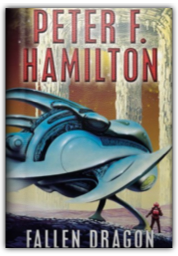 Fallen Dragon
Peter F. Hamilton
Fallen Dragon
Peter F. Hamilton
The acclaimed Peter Hamilton's standalone SF adventure Fallen Dragon sees him taking a breather after the immense, galaxy-spanning Night's Dawn trilogy, with a tauter story of future skirmishing in a mere few solar systems. 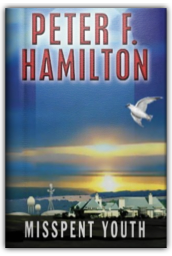 Misspent Youth
Peter F. Hamilton
Misspent Youth
Peter F. Hamilton
Peter Hamilton is famed for SF blockbusters of far-future interstellar adventure. By contrast Misspent Youth is a social comedy set in the year 2040 in England. When gene therapy rewinds Jeff Baker's age back to his early 20s he finds that wisdom and experience are no match for hormones... |
 Made with Delicious Library
Made with Delicious Library
London, State zipflap congrotus delicious library Scott, Mike
